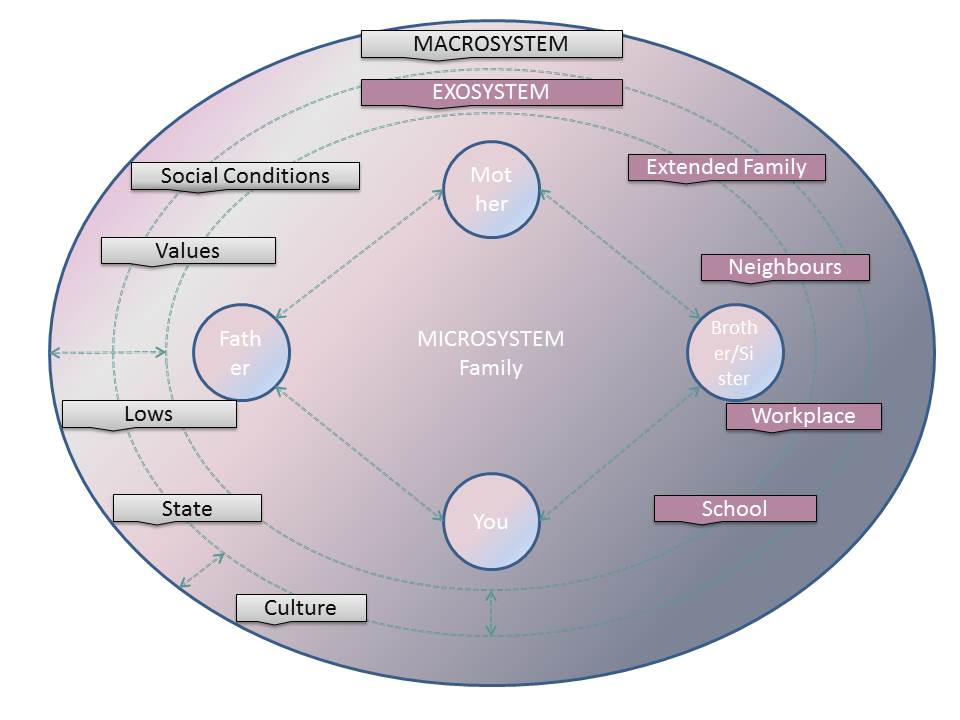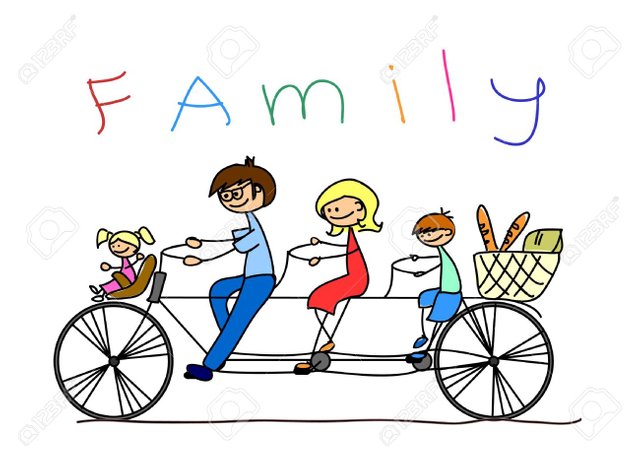What is family – Systemic psychological approach
Hello Steemian friends! This post is the first of a series about the family function by the perspective of the systemic view of psychology. I hope you find it interesting and wait for the next posts!!
According to systemic psychological approach, family constitutes a dynamic system, where every member has its own role. Family members interact with each other, whereas at the same time they accept influences from the environment outside the family system. Subsystems are developed inside the family system based on members’ age, gender, interests and function. These subsystems are divided by interpersonal boundaries. Boundaries, also, separate the family from the outside environment.
When boundaries between the family and other external systems are rigid, the interaction between them is restricted, so family is independent but isolated. In case the boundaries are diffused, then family has access to other systems but depends on them. So, semi-permeable boundaries between family and external world are leading to more balanced transactions.
Since family is not a static system but changes over time, the rules which define the members’ roles and the family functioning should follow the existing changes. The marriage, the child’s birth, the retirement of a spouse, are examples of changes that require rules’ shift and adaptation. Social factors linked to the general family integration system seem, also, to influence the family’s structure.
Although family members differ from each other (different chronological age or level of mental maturation) they have to find a well-balanced co-existence way in order to achieve a regular family functioning. During the family’s functioning evaluation, an expert takes into account:
• The emotional climate - the emotions of the members, the way members express their self and their feelings and how they manage them.
• The members’ communication.
• The boundaries between them.
• The boundaries between the family and the external environment - the family’s capability to create and maintain links with external systems in order to support and improve its functioning and satisfy its needs.
• The coalitions between the members and the subsystems created because of them, the causes leading to the establishment of a coalition and the consequences.
• The ability to maintain stability.
• The adaptive capability - the way family reacts, handles and adapts in cases of a change which disrupts its homeostasis.
• The coping strategies - strategies used by the members and the whole family to solve the problems.
Concerning the role of the family, its aim is to develop the personality of its members. In order to achieve this, family should provide not only material goods to meet the basic needs (food, shelter), but emotional safety to foster members’ creativity and initiative, and the appropriate standards which will prepare children to take on social responsibilities.
Η οικογένεια αποτελεί ένα δυναμικό σύστημα, όπου κάθε μέλος έχει το δικό του ρόλο. Τα μέλη αλληλεπιδρούν μεταξύ τους, ενώ παράλληλα δέχονται επιδράσεις και από το κοινωνικό περιβάλλον. Εντός του οικογενειακού συστήματος δημιουργούνται υποσυστήματα βάσει ηλικίας, φύλου, ενδιαφερόντων και λειτουργίας που χωρίζονται με διαπροσωπικά όρια. Όρια διαχωρίζουν την οικογένεια και από το εξωτερικό/κοινωνικό περιβάλλον.
Όταν τα όρια είναι άκαμπτα, η επαφή με εξωτερικά συστήματα είναι περιορισμένη με αποτέλεσμα η οικογένεια να είναι ανεξάρτητη αλλά απομονωμένη. Στην περίπτωση που τα όρια είναι διαπερατά η οικογένεια έχει πρόσβαση σε εξωτερικά συστήματα, άρα λαμβάνει υποστήριξη, όμως εξαρτάται από αυτά. Υγιή θεωρούνται τα ημιδιαπερατά όρια μεταξύ οικογένειας και εξωτερικού κόσμου.
Δεδομένου ότι το σύστημα δεν είναι στατικό αλλά μεταβάλλεται μέσα στο χρόνο, οι κανόνες που συνιστούν προϋπόθεση για την εύρυθμη λειτουργία του ορίζοντας το ρόλο κάθε μέλους αναμένεται να ακολουθήσουν τις υφιστάμενες μεταβολές. Παράδειγμα μεταβολών που απαιτούν αλλαγή των κανόνων και προσαρμογή αποτελεί ο γάμος, η γέννηση των παιδιών, η συνταξιοδότηση ενός μέλους. Κοινωνικοί επίσης παράγοντες, που συνδέονται με το γενικότερο σύστημα ένταξης της οικογένειας φαίνεται να επηρεάζουν τη δομή και τη μορφή που λαμβάνει το οικογενειακό σύστημα.
Τα μέλη δεν είναι ίδια μεταξύ τους, αλλά διαφέρουν ως προς την χρονολογική τους ηλικία, το επίπεδο της ψυχικής τους ωρίμανσης, ωστόσο θα πρέπει να βρουν έναν τρόπο αρμονικής συμβίωσης, έτσι ώστε η οικογένεια να είναι λειτουργική. Κατά την αξιολόγηση της λειτουργικότητας μιας οικογένειας τα στοιχεία που λαμβάνουμε υπόψιν μας είναι:
• Το συναισθηματικό κλίμα που επικρατεί - τρόπος που τα μέλη εκφράζουν τον εαυτό τους και τα συναισθήματά τους και τα διαχειρίζονται.
• Την επικοινωνία των μελών.
• Τα μεταξύ τους όρια.
• Τα όρια μεταξύ οικογένειας και εξωτερικού περιβάλλοντος - ικανότητα της οικογένειας να αναπτύσσει και να διατηρεί σχέσεις με άλλα συστήματα έξω από αυτή προκειμένου να υποστηρίξει και να βελιτώσει τη λειτουργικότητά της και να ικανοποιήσει τις ανάγκες της.
• Τις συμμαχίες και τα υποσυστήματα που δημιουργούνται λόγω αυτών, τα αίτια και τις συνέπειες του σχηματισμού συμμαχιών.
• Την ικανότητα διατήρησης σταθερότητας.
• Την προσαρμοστική ικανότητα σε περίπτωση μεταβολής των συνθηκών που διαταράσσει την ομοιόσταση της οικογένειας.
• Την αποτελεσματική αντιμετώπιση των προβλημάτων που προκύπτουν.
Όσον αφορά στο ρόλο της οικογένειας στόχος της είναι η ανάπτυξη της προσωπικότητας καθενός εκ των μελών που την απαρτίζουν. Προκειμένου αυτό να είναι εφικτό κρίνεται σκόπιμο πέρα από την εξασφάλιση των απαραίτητων υλικών αγαθών και την κάλυψη των βασικών αναγκών (τροφή, στέγη) να παρέχεται συναισθηματική ασφάλεια, να καλλιεργείται και να ενθαρρύνεται η δημιουργικότητα και η ανάληψη πρωτοβουλιών, να παρέχονται τα κατάλληλα πρότυπα που θα προετοιμάσουν τα παιδιά να αναλάβουν κοινωνικές ευθύνες.
Source: Nichols, M. P. (2013). Family therapy: Concepts and methods (10th Edition). United States of America: Pearson.
Image source: https://www.123rf.com/clipart-vector/family_sport.html



Congratulations! This post has been upvoted from the communal account, @minnowsupport, by veibone M2W from the Minnow Support Project. It's a witness project run by aggroed, ausbitbank, teamsteem, theprophet0, someguy123, neoxian, followbtcnews/crimsonclad, and netuoso. The goal is to help Steemit grow by supporting Minnows and creating a social network. Please find us in the Peace, Abundance, and Liberty Network (PALnet) Discord Channel. It's a completely public and open space to all members of the Steemit community who voluntarily choose to be there.
Congratulations @estersoul! You have completed some achievement on Steemit and have been rewarded with new badge(s) :
Click on any badge to view your own Board of Honor on SteemitBoard.
For more information about SteemitBoard, click here
If you no longer want to receive notifications, reply to this comment with the word
STOPΗ οικογένεια είναι το κύτταρο της κοινωνίας με ότι αυτό συνεπάγεται!
Congratulations @estersoul! You have completed some achievement on Steemit and have been rewarded with new badge(s) :
Click on any badge to view your own Board of Honor on SteemitBoard.
For more information about SteemitBoard, click here
If you no longer want to receive notifications, reply to this comment with the word
STOP@estersoul you were flagged by a worthless gang of trolls, so, I gave you an upvote to counteract it! Enjoy!!
Congratulations @estersoul! You received a personal award!
You can view your badges on your Steem Board and compare to others on the Steem Ranking
Vote for @Steemitboard as a witness to get one more award and increased upvotes!